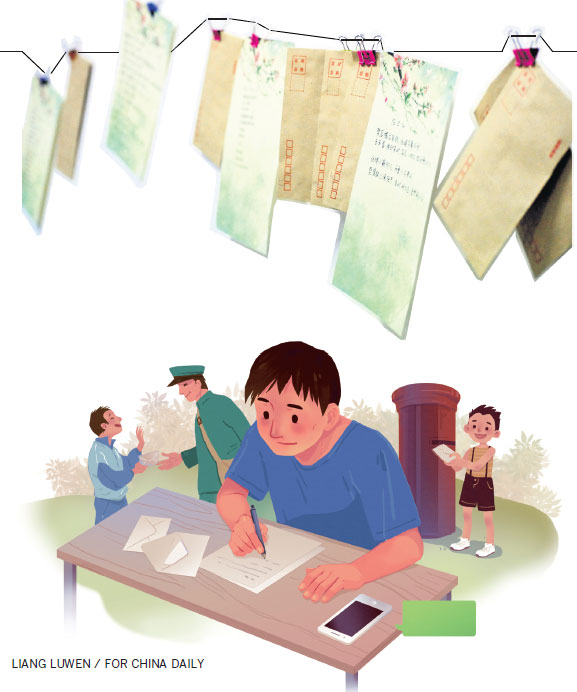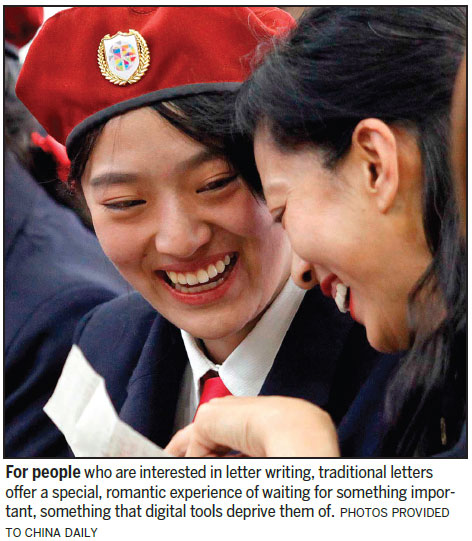Write way to keep in touch
Old ways die hard when it comes to communicating and more people are finding that where there's a quill, there's a way
You may have thought that in a world of tweets and emoticons, where slipshod and snappy trumps elegant and erudite, handwritten letters would have had their day.
But don't throw away that fountain pen, inkwell and blotting paper just yet. And keep hold of those postage stamps, too.

It seems that as most of us float with the technological zeitgeist, a large group of people is swimming against the tide, its members treasuring what they regard as the special way that handwritten letters link people - and they are doing their darnedest to ensure that what apparently began with hieroglyphics stays with us for a few millennia yet.
"I enjoy writing and sharing my ideas," wrote Ren Shuangjiang recently on Douban, a popular user-based cultural and social website in China.
"I'm keen on making good pen pals with whom I can communicate using paper and pen, and sharing my true feelings through words on the paper."
Ren, of Fuzhou, Fujian province, a junior college student, is one of the many enthusiasts who scout on Douban for pen pals on a forum dedicated to topics about handwritten letters.
Ren says he values the intimacy and individuality of handwriting, and the uninterrupted "soul to soul" exchanges in the form of traditional letters.
"Modern technology has reduced the distance between people in many ways, but in some way it has alienated us emotionally, and writing letters is a means of strengthening such connections," says Ren, who has found a couple of pen pals to correspond with regularly.
"You can almost read a person's feelings through their handwriting, and everything beyond words tells you something, too. You can't see that in digital messaging."
Today, very few people write personal letters, even though many who have got used to instant communication tools such as emails, instant messaging or phone apps are nostalgic for the days of pen and paper.
Initiatives such as writing letters have been taken up enthusiastically by people who originally linked up with one another using the internet but want to try to interact in the more traditional way of personal letters.
On Douban are dozens of such interest groups, some with thousands of members and with long threads of topics related to the art and practice of handwriting.
The topics are often started by individuals willing to receive traditional letters from strangers, with their street addresses provided. Others compare their experiences, including the excitement of receiving a special letter or unusual personal stories from the "age of correspondence".
Some of the many topics continue to draw responses even years after the contribution that got the discussion going.
On other platforms such as Sina Weibo, a large online social platform in China, people interested in letter writing can chat with one another and share ideas. This includes participants displaying pictures of letters received in bygone years and talking of the memories they have related to them.
While some people are satisfied with taking a walk down memory lane and leaving their letters there, others maintain letter writing as an art form and a way of life.
"A letter is not only about the words it contains," says Wei Guangying, 22, of Qingdao, Shandong province.
"It's a complete experience. The paper stock, the doodles, the handwriting and how the letter is eventually delivered all matter.
"I'll never forget the moment I received my first letter. It was so wonderful. Traditional letters offer a special, romantic experience of waiting for something important, and digital tools deprive us of that joy."
Wei says he started writing letters and postcards when he was at primary school. He often used his pocket money to buy attractive paper or cards from street stalls. On these he would write lines of his favorite poetry or his everyday thoughts and mail them to friends or classmates.
He has kept up correspondence with a few pen pals over the years, he says, and with the letters he sometimes includes items such as some of his own watercolor painted cards, a flower or a souvenir from his travels.
The letter paper, the envelopes and the stamps are just as important as the other contents because they can send different messages, he says.
His recipients include former teachers whose addresses he has made a point of keeping, especially for occasions such as Teachers' Day.
Ma Ben of Hangzhou, Zhejiang province, says she started writing letters when she was an undergraduate student in Nanjing, under the influence of her Australian English-language teacher, himself a keen advocate of letter writing.
Later, when she studied in Britain in 2012, she was surprised to find that sending letters or postcards was still popular there, especially at times of celebration.
"The pretty stamps in Britain were additional attractions for me. So I started to write more letters, and have kept that up with friends since I returned home."
She is keen for each letter she writes to be unique, and that includes spraying them with perfume, changing writing styles or including a little gift. The importance of putting in that extra effort is clear when she herself receives a letter.
"When an envelope finally reaches me after traveling from afar it immediately lifts my spirits."
Shi Languang, a junior university student in Nanjing who started to write letters three years ago, says he enjoys the traditional way of communication.
He was troubled by the fact that he often got nervous when he talked to a girl he liked in person, and sometimes there were misunderstandings, so he decided to communicate with her by letter, he says.
"I can take my time and don't have to worry about failing to correctly express myself .... The receiver gets a more accurate idea of what I am saying, too. I reckon handwritten letters can express more feelings than words can on a screen."
Even sending the letter is something to savor, he says.
"When my carefully written letter drops into the mailbox I'm thinking about what the person receiving it will feel and look forward to receiving the reply."
Completely counter to the impatience that the world of instant messaging can engender, some aficionados of the handwritten letter find that waiting for the reply is part of its pleasure. As they wait, thoughts and emotions have time to develop and become clearer.
Zeng Jinlan, who works in a beauty salon in Nanchang, Jiangxi province, is another of those who swears by the power of the handwritten word.
She often writes to her regular customers on the occasion of festivals to express her gratitude, she says, sometimes mentioning something they have experienced together.
Some customers return the thanks and post pictures of her notes on their WeChat "moments" page.
Her letters have also helped to melt the ice with some customers with whom she did not quite see eye to eye, she says.
On Taobao, the online shopping platform, many sellers are also taking advantage of the power of traditional letters to win loyalty and favorable reviews from customers.
Many buyers who come across a handwritten letter with a parcel they receive say how much they appreciate it.
Ma Lele, a Taobao user, says he was surprised recently when he found a red envelope containing five yuan and a long handwritten note of thanks with a parcel from a Taobao shop.
"I couldn't believe that the first letter I received after all these years was from a Taobao seller, and I was very touched. There are few chances to write, or receive, letters nowadays, and I think people miss that time when people dealt with each other through letters and handwritten words."
Nevertheless, a nostalgia by many for handwritten letters does not mean people necessarily want to turn back the clock, and traditional letters can barely fulfill today's communication needs as they used to, says Xu Mintong, a cultural scholar who regularly comments on cultural and social issues on media.
On the other hand, while digital channels can speed up communications, they reduce people's investment emotionally and in time, and communication is often done with fragmented information, he says.
The nostalgia phenomenon can be understood as a desire for a return to a more slow-paced life, waiting and feeling that, in seeing someone's handwritten words, the recipient is in fact meeting the sender.
"The art of letters represents a more 'serious' age, and its demise means the death of certain traditional cultural spirit," Xu says. "Now there is a collective call for such a cultural spirit, and that's a good thing."
In addition to the impact of modern tools, the decline of public infrastructure to support private exchange is another factor that has contributed to the decrease of personal letters.
Mu Dongnuan, of Guiyang, Guizhou province, says it is increasingly difficult to write letters as it gets more difficult to find the necessary materials and to mail them.
When he went back to his hometown in Bijie, Guizhou province, recently, he was disappointed to find that the local stationer no longer sold postage stamps.
"Will there come a day when I cannot mail a letter, even if I can write one?" Mu asks.
"Some of my friends even thought that a postal service for ordinary letters had disappeared and that postage stamps were just collectors' items."
Yu Chengqian, who lives in Beijing, says people's frequent changes of address, especially those in the cities, also make it difficult to maintain correspondence.
Another possible reason for the disappearance of traditional letters is that people are often embarrassed by their handwriting skills, the decline of which is a result of the prevalence of typing.
liuxiangrui@chinadaily.com.cn

(China Daily European Weekly 07/13/2018 page16)

 Shandong Culture and Tourism Consumption Season
Shandong Culture and Tourism Consumption Season Culture, tourism sectors pick up in Shandong as epidemic wanes
Culture, tourism sectors pick up in Shandong as epidemic wanes

